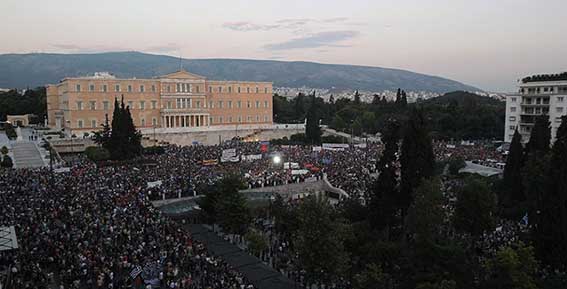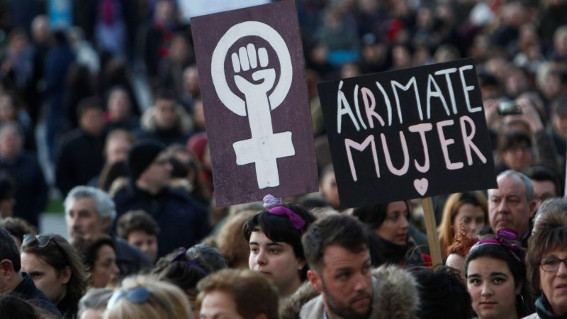In the referendum of July 5, we, the women of the afflicted majority, owe it to ourselves to vote against the proposal of the creditors; and we will explain the reasons why. It is true that during the past week we may have felt fear, insecurity, uncertainty and that decisions are made somewhere out there, beyond our control. We are constantly hearing the words “blackmail” and “ultimatum”, “pride” and “servitude”, as well as metaphors about countries driven into the rocks, off the cliffs and other accidents. And all around us, there is so much fanaticism and fury, often obscuring any rational arguments. How can we not worry? How can we keep our senses? And most importantly, what should we do?
Let’s take a look around us. On one hand we see the mess that the continuous austerity measures have brought, in every aspect of our lives. Especially us women, during the past years, we have been asked to take on an even bigger burden than usual. It’s not just the increased “care” labor shouldered by many of us inside the home, or the rising unemployment and precarious labor outside the home. With them came increased violence, harassment and all kinds of everyday sexism. Some of us remain trapped in the family home, with fathers and brothers looming over our heads (who we may love, but that is not the issue, is it?), while others would like to start our own family, but cannot. As if worrying about ourselves, our jobs and our diminishing rights was not enough, we also have to worry about our children, partners, parents, neighbors and friends and race around trying to “care” for everyone. And those of us who are trans, lesbian, immigrants and/or with darker skin, have to face further exclusion, violence and more problems…
On the other hand, we saw hope. We saw initiatives, collectives and all kinds of collaborative initiatives. We lived the protests of the squares, we held popular assemblies and organized collective kitchens. We supported the struggle for the reinstatement of the cleaning ladies fired from the ministry of Finance, and the effort to re-open public broadcaster ERT- while exercising our criticism, no matter. We learned to use social media, facebook, twitter and blogs for organizing ourselves. We learned to give away our old clothes, washed and folded, as well as food to those in need. When we saw that our dreams will not be realized, we felt very afraid. But we had already adapted and survived. And during this trajectory, we saw that there is another way. When we look around us, those experiences are like pebble stones that fell into place to compose an image of our lives.
Some would of course tell us that all this is populism and that politics means talking with macroeconomic indicators and statistics about the “people”, the “nation” and its -abstract- good. However, our feminism has taught us that politics cannot be detached from the experience of our daily lives. Feminism has also taught us that these generalizations, which underpin many of the analyses that are used to make policy decisions, are ultimately the narratives of white, Western, middle-class, cis straight men. So they are anything but comprehensive and global. This is why we have to clarify that we want nothing to do with cockfights about who is a political coward and who has “balls”. We are not interested in bleeding for “national unity”, because we know what is the position of women in this narrative, and our “pride” or “humiliation” do not depend on the course of negotiations or a ballot box. We are proud anyway because our struggle is daily, at home, at work, in the street and we won’t let anyone assume otherwise.
We will close our ears to those voices trying to distort what we know and live and sell us their own reality as a unique narrative. We will say “no” to new austerity measures, because we won’t forget that this crisis is not ours, and predatory austerity should not be loaded on our backs. We will say “no” to the European Union of inequality, sexism and austerity, the European Union that assumes and promotes unpaid “care” labor from all of us, and rewards us with precarious employment and violence in order to save banks. We have now learned about solidarity and collective effort, we know the democracy of the assemblies and this is the Europe we demand. Our need is to live past today. Our desire is to live in a society with equality and justice -and we will fight for it.
We are joining in our voices, we support the struggles!
On 5/7 we all vote “no” to the Memoranda, to austerity, to blackmail
fylo sykis /www.fylosykis.gr
translated by Ioulia Livaditi
In Greek:






